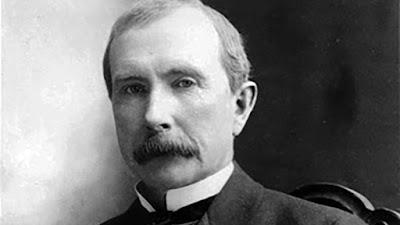 |
| Rockefeller: Uncommonly wealthy |
“The secret of success is to do the common things uncommonly well.”
John D. Rockefeller, Founder of Standard Oil
It can be reasonably argued that the men behind Standard Oil, principally John D. Rockefeller, understood the power of monopoly better than anyone in the 19th century. Effectively, every part of the Standard Oil operation was designed, maintained, and built on to give the company a sustained monopoly in a commodity industry.
It was its steadfast determination to build this monopoly which was ultimately the company’s undoing, bringing it into the focus of the Department of Justice which filed an antitrust lawsuit against the company in 1909. At the time of the lawsuit, Standard Oil could have controlled as much as 90% of oil refining in the United States.[i]
Standard Oil was subsequently broken into 34 separate companies (Chevron, Exon, Mobil, Conoco and others). None were ever able to reach the scale achieved by Standard Oil, which aside from antitrust legislation suggests that the original company provided a number of lessons for achieving scale and fast. Some of these lessons follow below:
Monopolizing technology
Standard Oil’s monopolization of oil fields in the United States is well documented. However, under the instruction of its founder John D. Rockefeller, it also meticulously sought out the most valuable patents in the extraction industry. This phenomenon was outlined by Harvard professor of economics, Frederic M. Scherer.[ii]
Scherer says: “Standard had an expressly articulated policy of […] screening the patents of outside inventors and acquiring rights to those it considered attractive.” This created what Scherer calls a ‘demand-pull’ among petroleum-process inventors, often giving it first access to acquire the most valuable patents before its competitors had even seen them.
Distribution is key to reaching scale
At the outset of the oil industry, the barriers to entry to oil refining were low. As John D. Rockefeller later noted: “All sorts of people went into it: the butcher, the baker and the candlestick maker began to refine oil.”[iii]Inevitably, most of them operated on a small scale, not seeing the potential in expanding beyond their state lines, where greater margins awaited.
Transportation was key to the success of Standard Oil. Unlocking cheap transportation meant it could supply cheaper oil than other refiners, accumulating massive market share in the process. A competitor of Standard Oil noted at the time that it had arranged transportation costs of ninety cents a barrel per rail, while competitors were paying around $1.30.[iv]
“Be greedy when others are fearful”
Following the Warren Buffett maxim, “be fearful when others are greedy and greedy when others are fearful,” Standard Oil saw every drop in the oil price not as a warning sign, but as an opportunity to acquire more. Rockefeller once said: “we must not lose our nerve when the market gets to the bottom as most people always do. We’ll make a mistake if we don’t buy.”[v]
This might also be termed ‘understanding the intrinsic value of what your product,’ and it’s clear from the behavior of many refinery owners at the end of the 19th century that they didn’t grasp the opportunity that oil entailed.
[i] See: https://learning.blogs.nytimes.com/2012/05/15/may-15-1911-supreme-court-orders-standard-oil-to-be-broken-up/
[ii] Scherer, F.M (2011). “Standard Oil as a Technological Innovator.” Faculty Research Working Paper Series, Harvard Kennedy School.
[iii] Yergin, D. (1991). “The Prize: The Epic Quest for Oil, Money and Power.” Free Press.
[iv] For further reading, see: Tarbell, I.M. (1904). “The History of the Standard Oil Company.” McClure, Phillips and Co.
[v] Yergin, D. (1991). “The Prize: The Epic Quest for Oil, Money and Power.” Free Press.
No comments:
Post a Comment